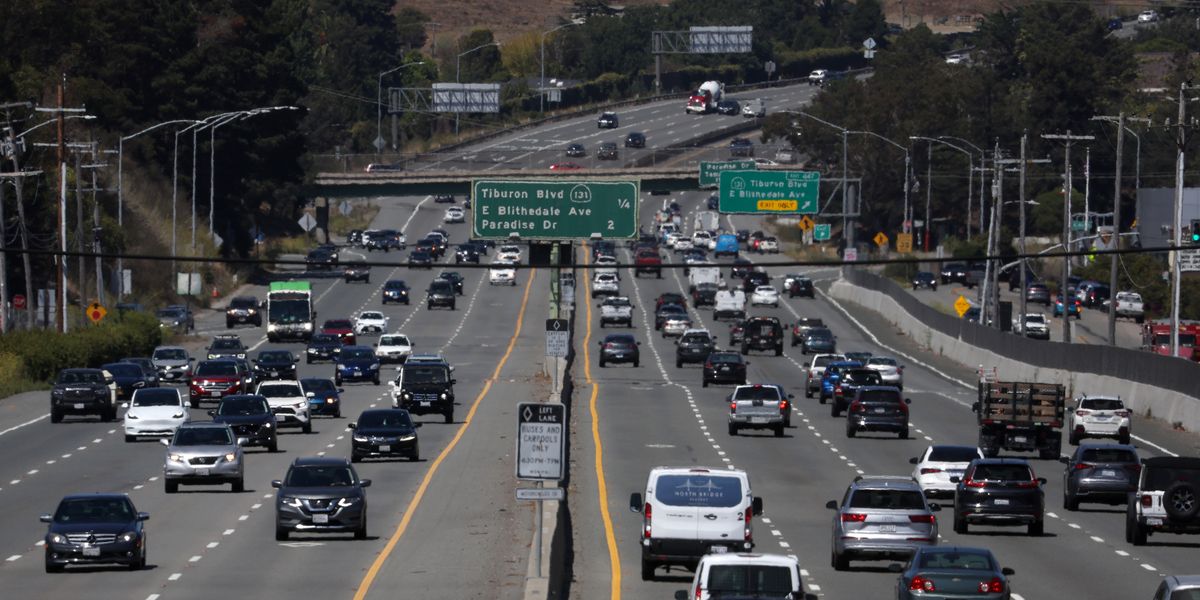4 Federal Departments: We're Joining Forces to 'Decarbonize' the American Road

The Departments of Energy, Transportation, Housing and Urban Development and the Environmental Protection Agency will work together on the massive task of implementing President Biden’s previously set goal of net-zero emissions economy-wide by 2050.The agencies will present the details of their decarbonization plan in the next 90 days, but we can already tell that it will focus on getting more EVs onto the roads as well as making other transportation options safer, cleaner, and more accessible.Two cities, Denver and Detroit, announced plans this week not to simply add more highways through their downtowns, but to rethink what can be done with that space.
Bill Pugliano|Getty Images
It’s not just electric vehicles that will reduce the amount of carbon generated by the U.S. transportation system. The Biden-Harris administration announced today that four federal agencies—the Departments of Energy, Transportation, Housing and Urban Development, and the Environmental Protection Agency—have signed a Memorandum of Understanding (MOU) that will attempt to reduce greenhouse gas emissions from the transportation sector and “ensure resilient and accessible mobility options for all Americans.”
President Biden (pictured, above, at the Detroit auto show this week) previously set a goal of net-zero emissions economy-wide by 2050. Reaching that will take a lot more than just getting lots of EVs and hydrogen semis on the road. The MOU says the four parties will work together “to achieve better integration of transportation, housing, and community development investments in underserved or disadvantaged communities.”
Detailed Blueprint Is Coming Soon
The four agencies now have 90 days to release a “comprehensive blueprint for decarbonizing the transportation sector.” This plan will almost certainly include projects that increase access to what the government deems to be safe and clean transportation options, as well as updating the electric grid for more EVs and reducing emissions from construction, the government said.
Some of this work is already starting, thanks to billions of dollars in clean transportation investments from the Bipartisan Infrastructure Law in 2021 and the Inflation Reduction Act this past summer. The government’s announcement says the four agencies will increase access to “more efficient modes of transportation like walking, biking, transit and rail, while lowering the costs of electric vehicles and other zero emission vehicles and fuels to allow American families and businesses the opportunity to immediately enjoy the benefits of the affordable, clean energy revolution.”
Downtowns Are Changing
That kind of transition can be seen in some potentially tangentially related news. Two large American cities announced plans this week to turn downtown highways into more livable city spaces. Michigan will use a $104.6 million grant from the Department of Transportation to replace the I-375 freeway in Detroit with a lower-speed boulevard, the Detroit News reported. In Denver, plans to expand I-25 Central were replaced with a plan to spend more than $100 million to boost the region’s rapid transit systems and improve street safety along the I-25 corridor.
These are the kinds of plans that HUD Secretary Marcia Fudge might have been referring to in her statement about the four-agency MOU.
“The people HUD serves deserve clean, affordable transportation options,” the Secretary said in prepared remarks. “HUD is proud to join our federal partners at Energy, DOT, and EPA to ensure that clean transportation investments are made equitably and include communities and households that have been most harmed by environmental injustice.”
This content is imported from OpenWeb. You may be able to find the same content in another format, or you may be able to find more information, at their web site.



